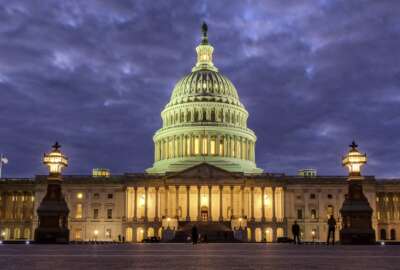Is entrepreneurship in government even a thing?
How many times have your heard the term, entrepreneurial government?
How many times have your heard the term, entrepreneurial government? Or that government functionaries should act like entrepreneurs. The Federal Drive with Tom Temin‘s guest wonders what that even means? He’s long-time federal union president and leadership professor Bob Tobias.
Interview Transcript:
Bob Tobias Well, Tom, we are, as you suggest, once again, hearing private sector leaders criticizing federal career leaders for failing to be entrepreneurs. And the assumption is, be like us, be brave like us, and the public will be better served. I think the implication is that federal sector leaders are risk averse bureaucrats, unwilling to take any kind of an entrepreneurial risk of being creative, but I think that’s just wrong. It’s disparaging and wrong because entrepreneurship is totally different in the federal sector. You know, we have this thing called the Constitution, and we have this thing called checks and balances. So, it’s really not possible to practice private sector entrepreneurship in the federal sector.
Tom Temin I think often what they mean is, you know, well, try to find better ways to do things. But, you know, government functionaries, government managers can’t really do new things. They have to do things that they’re empowered by law and statute to do according to the policies that they’re given, and they can find more efficient ways to do that and more innovative ways to do that. But they can’t do something different the way entrepreneurs can.
Bob Tobias Yeah. That’s right. I mean, if Elon Musk wants to redesign a Tesla, he does.
Tom Temin I wish he was there getting kind of stale looking. You know, I have the same car for 12 years or whatever.
Bob Tobias You know, if he sells more cars, you know, Tesla’s banks and the stakeholders and Elon are very, very happy. And if he doesn’t, they’re unhappy. But the hallmark of federal sector leadership, entrepreneurship is just the opposite. It’s creativity in an environment where there’s no agreement on government purpose, goals or how to measure success. And as our Constitution requires, there’s significant limitation on the freedom to design and implement proposals. So, you know, if you’re a federal sector leader and you have this brilliant suggestion on how to collect more money from people who don’t pay taxes or any other issue, you have to first get approval from your agency, then from the department, then from OMB, then from the president, and finally from Congress. Only the creative and persistent need apply. Again, just the opposite of the private sector flexibility. And oftentimes in the federal sector, reaching agreement is impossible because there’s no agreement that a problem actually exists. So, for example, NOAA last year pointed out that there was $165 billion lost in 2023 to climate change issues. So federal sector leaders made proposals to mitigate climate change, and they went nowhere or not very far, because some people in Congress believe that the Earth will heal itself. So, there’s no problem and no solutions are required. Or consider the IRS. Everybody agrees that government debt is an issue and should be reduced. So, Congress agreed and said, well, we’re going to give the IRS $80 billion over ten years to increase audits on those who make $400,000 or more. So, the IRS started conducting more audits and on average, got $2 for every dollar invested and $6 for every dollar invested on those who were audited in the top 1% of wealth in the country. Now, I would say, Tom, that’s an entrepreneurial jackpot. Anybody who gets $2 back for a dollar invested or $6 back for a dollar invested, that’s a pretty good. But Congress decided to reduce the amount from 80 billion to 60 billion.
Tom Temin We’re speaking with Bob Tobias, former American university professor and NTEU president. But that’s not really entrepreneurship. That’s Congress deciding on a tax policy and a government agency operational policy that they believe would produce something. But it wasn’t up to the IRS to institute that policy.
Bob Tobias Correct. That’s exactly the point. If you’re in the private sector, nobody would come along and say, well, the policy needs to be changed. They would only say, hey, IRS, you made more money. We’re going to give you more money to collect. That is precisely the point. In the private sector, it’s money. In the public sector. In the federal sector, it’s policy. So, calling on people to behave as though money matters is just wrong.
Tom Temin Well, the other thing about Silicon Valley is that it purports anyway, to admire people that are serial losers, even because eventually you’ll hit the jackpot. And what you don’t hear as much for every Silicon Valley success story is how much money went down the drain and produced nothing for the investors. But the difference is that’s the investors’ money, and the public isn’t harmed as it is when the government wastes money.
Bob Tobias Well, you know, failure oftentimes leads to great learning and new innovation, but there’s no room for failure, as you suggest in the public sector. If there is failure, then there are congressional increases. The inspector general reports, GAO reports. So, there’s no opportunity to learn, which, again, is one more difference between the federal sector and the private sector. You know, notwithstanding all of these problems and limitations I’ve been mentioning, there are huge successes. As the partnership for Public Service points out every single year with its Sammie Awards. I mean, this last year, there was an award for an HHS team that made some significant progress on opioid death reduction, or the NASA team that proved that could send a rocket to an asteroid and move its course so it wouldn’t crash into the Earth. Or the FBI team that collaborated all across the world to arrest on a single day a thousand drug traffickers. Now, these are significant successes, but it’s not the fault of the career federal employees. That agency government purpose is unclear and often shifting, or the goals are hard to measure, or funding linked to goal achievement doesn’t often exist. So, the Constitution didn’t create the executive branch to be a business. And I think that glib criticism that it should be run like a business should cease.
Tom Temin Right. So maybe a better approach, a better language approach, whatever you want to call it is. Yes, you should have. And I don’t like the word bureaucrat, but you should have federal managers be innovative in how they carry out the programs and policies. But you can’t ask them to innovate on policy and programs to begin with. That’s really not the job of the standing civil service.
Bob Tobias That is correct. There is always room for increased efficiency, increased effectiveness and offering policy solutions, but it’s not the responsibility of those federal employees to implement those policies and solutions. That’s not part of being an entrepreneur in the federal government.
Copyright © 2024 Federal News Network. All rights reserved. This website is not intended for users located within the European Economic Area.
Tom Temin is host of the Federal Drive and has been providing insight on federal technology and management issues for more than 30 years.
Follow @tteminWFED






